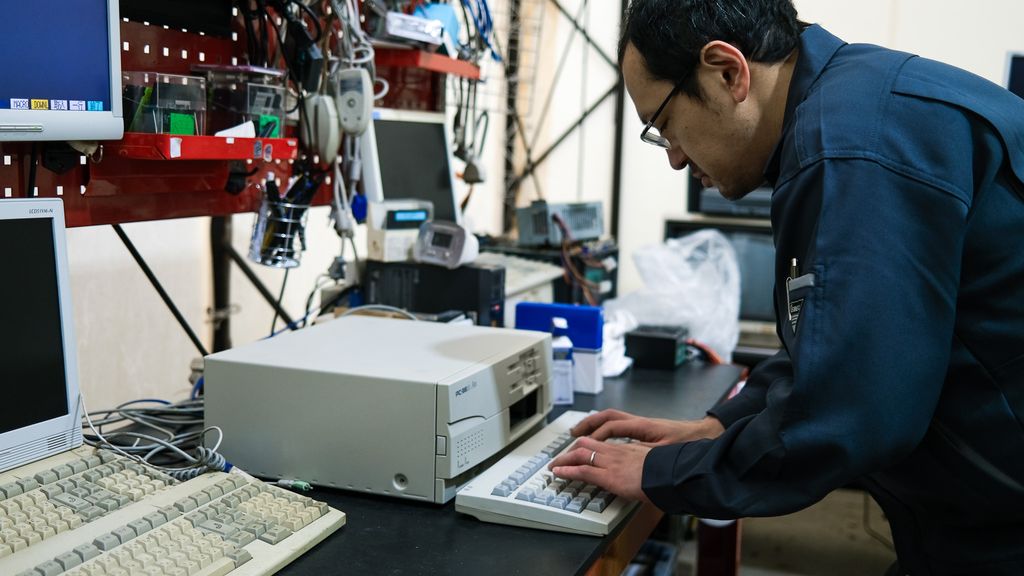Noos News•
In a warehouse hidden in the mountains behind Mount Fuji, there are towering storage tanks containing old computers. “We often sell these devices to factories, medical institutions and government agencies,” said Tomoharu Iguchi, owner of PC Mishima, a company that specializes in selling and repairing PC-98 computers. It passes through the shelves where different models are stacked. “They all have a floppy drive. It’s a must have,” Iguchi continues. “This is what most customers ask for.”
Japan is famous for its advanced technologies. It was therefore surprising that the government announced only this year that it wanted to stop using floppy disks in official procedures. More than a thousand administrative protocols still use these 1.4MB plastic disks.
“This could be enough storage space to store a photo from your smartphone,” says Yu Ishigaki, a professor at the National University of Electrical Communications in Tokyo. “But people are sticking with it.”
Old but safe and reliable
Aging populations play a major role in clinging to outdated technology. “Most customers are working people over 60. Some of them are already in their 70s or 80s. They can’t give up these computers,” says Iguchi. “They’re used to it. For them, it’s like working with pen and paper.” At the same time, it is the older generation that decides the technology used in large organizations. Therefore, there was no question of switching to new systems for a long time.
Safety is also an important factor. “Floppy disks were invented before computer viruses,” says Ishigaki. “So users simply don’t have any problems with it.” In addition, older computers are simple compared to modern models. This makes the lifespan long and maintenance easy. “We clean the interior and change the oil in the drives,” Iguchi explains as he unscrews the computer. “We can do it quickly.”
Dozens of keys hang on the side of a shelf near the entrance to Mishima’s computer. Key rings from brands such as Toyota and Nissan hang on key rings. “Factories in particular are still running with these old models,” Iguchi explains. “They invested tens of billions in the 1980s in equipment that is ultimately supposed to last 40, maybe 50 years. And then it doesn’t quickly switch to something new.”
However, it causes problems in the innovation sector. “It is difficult for scientists to exchange information with foreign colleagues,” says Ishigaki. “The data is physically on disks, so you can’t share it over the cloud. Moreover, no one outside of Japan works with these types of systems anymore.”
The war on floppy disks
Digital Affairs Minister Kono declared war on floppy disk on social media in 2022. The politician is known for his progressive stance within the ruling Liberal Democratic Party. One of his personal missions is to combat years of stagnation in the national bureaucracy, using technology as a spearhead. Easier said than done.
Only two years after Kono’s statement, the Ministry of Economic Affairs announced that it would bid farewell to the floppy disk. More than 90 percent of the formalities that were still using the old technology have now been eliminated. Thousands of regulations and laws have been amended to enable the transition to new technology.
A reliable hard drive cost thousands of dollars in the 1990s. This was unsustainable at the time for an economy that was in recession.
However, the full switch remains stuck at crucial points. “Medical institutions are required to keep patient information for decades. In some cases, it must be kept forever,” says Ishigaki. “The vast majority of them are on floppy disks.” Transferring this data can take years.
“It’s going slowly because the government hasn’t been able to invest in purchasing new technology for a long time,” Ishigaki explains. “A reliable hard drive cost thousands of dollars in the 1990s, which was unaffordable for an economy that was in recession at the time.” Technology is now cheaper and the Japanese economy is stronger. “That’s why it’s time to make this leap,” the professor said.
However, Iguchi is not concerned about declining sales in the short term. “Current users have invested in using these computers and floppy disks. I don’t expect that to change anytime soon.”

“Lifelong zombie fanatic. Hardcore web practitioner. Thinker. Music expert. Unapologetic pop culture scholar.”








